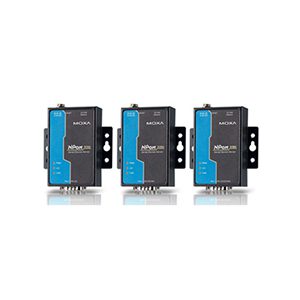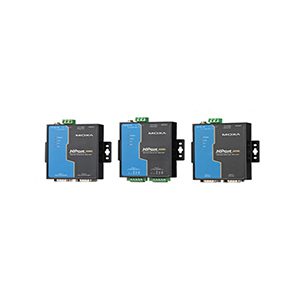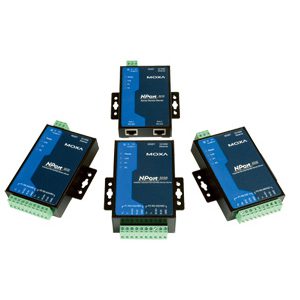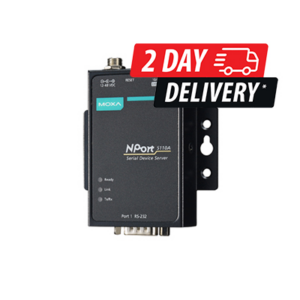The Moxa NPort 5100A device servers are designed to make serial devices network-ready in an instant and give your PC software direct access to serial devices from anywhere on the network. The Moxa NPort 5100A device servers are ultra lean, ruggedised, and user friendly, making simple and reliable serial to Ethernet solutions possible.
A Greener Serial-to-Ethernet Solution
The MiiNe is a small but powerful ARM-based serial-to-Ethernet SoC with RAM and Flash embedded. With the MiiNe inside, the Moxa NPort 5110A series becomes the world’s only device server with power consumption less than 1 W. The Moxa NPort 5100A series saves at least 50% on power consumption compared to existing solutions on the market, helping engineers meet the tough environmental compliance challenges found in today’s industrial environments.
Surge-protected Serial, Ethernet, and Power Lines
Surge, which is typically caused by high voltages that result from switching and lightning transients, is a common threat to all electrical devices leading-edge surge immunity solution, which is applied to the Moxa NPort 5100A’s serial, power, and Ethernet lines, is tested and proven compliant with IEC 61000-4-5. This state-of-the-art surge protection provides a robust serial-to-Ethernet solution that can protect electrical devices from voltage spikes and withstand electrically noisy environmental conditions.
3-step Web-based Configuration
The Moxa NPort 5100A’s 3-step web-based configuration tool is straightforward and user-friendly. The Moxa NPort 5100A’s web console guides users through 3 simple configuration steps that are necessary to activate the serial-to-Ethernet application. With this speedy 3-step web-based configuration, a user only needs to spend an average of 30 seconds to complete the Moxa NPort settings and enable the application, saving a great amount of time and effort.
Easy to Troubleshoot
Moxa NPort 5100A device servers support SNMP, which can be used to monitor all units over Ethernet. Each unit can be configured to send trap messages automatically to the SNMP manager when user-defined errors are encountered. For users who do not use SNMP manager, an e-mail alert can be sent instead. Users can define the trigger for the alerts using Windows utility, or the web console. For example, alerts can be triggered by a warm start, a cold start, or a password change.
Features
- Only 1 W power consumption
- Speedy 3-step web-based configuration
- Surge protection for serial, Ethernet, and power lines
- COM port grouping and UDP multicast applications
- Screw connectors for secure installation
- Real COM/TTY drivers for Windows and Linux
- Standard TCP/IP interface and versatile TCP and UDP operation modes
- Connect up to 8 TCP hosts





There are no reviews yet.